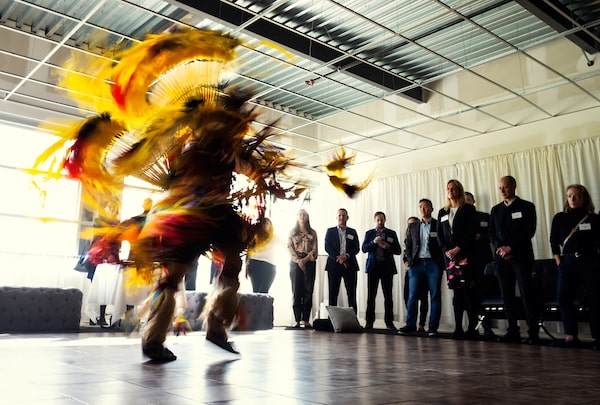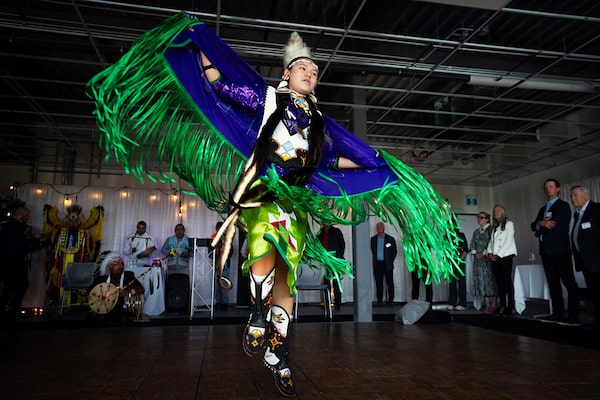
The opening of Fasken's Tsuut'ina office near Calgary.Handout
The first thing Brenden Hunter pointed out in the boardroom of Fasken Martineau DuMoulin LLP’s new office in the Tsuut’ina Nation, just outside Calgary, was the art.
Painted on panels hung around the inner circumference of a doughnut-shaped boardroom table was a stunning mural of Prairie grasslands meeting the Rocky Mountain foothills. On a clear day, the view through the windows matches the painting, which was done by a local Indigenous artist.
The second thing Mr. Hunter noted was the table itself: it’s round, not a standard-issue corporate rectangle.
Fasken, one of Canada’s largest law firms, with offices across the country, chose a different type of tabletop for its Tsuut’ina location because Indigenous groups prefer to gather and make decisions in circles, according to Mr. Hunter, a member of the Saddle Lake Cree Nation and the new office’s managing partner. The firm deliberately avoided tables that force people to face each other directly in adversarial negotiations.
This cultural sensitivity is a hallmark of what Fasken wants to achieve at its new location, which the firm’s leadership believes is North America’s first corporate law office on an Indigenous reserve. The facility is part of Taza, a 1,200-acre, $11-billion, Indigenous-owned development project that is reshaping southwestern Calgary. In 2020, Costco opened a store there, its first on a First Nations reserve. That outlet is now one of the chain’s busiest.
Fasken’s new 6,000-square-foot space is a tangible sign of commitment to reconciliation with Indigenous peoples, part of the firm’s strategy to improve the way it does business with and for Indigenous clients. Fasken, which has more than 900 lawyers, launched its firm-wide reconciliation plan two years ago, on the first National Day for Truth and Reconciliation.
Like most national law firms, Fasken is doing an increasing amount of work with Indigenous groups, on files that range from land claim settlements to pipeline approvals. Mr. Hunter said the firm’s goal “is to move past transactional relationships to a place where we are considered important, thoughtful members of the community.”

The site includes a robust HVAC system, to clear smoke from indoor smudging ceremonies.Handout
Clients are taking note. At the Taza office’s opening event last week, an Indigenous ceremony was performed for an audience that included executives from a number of energy companies, including Fortis Inc., TC Energy Corp. and TransAlta Corp. These companies have also been working to build stronger ties with Indigenous groups, including by striking equity partnerships with them on projects.
The new office is also meant to be a central part of the firm’s push to attract and retain new legal talent.
“The Taza office presents ideal headquarters for our project teams and an opportunity for the firm to deepen its relationships and advance Indigenous recruitment,” Peter Feldberg, Fasken’s national managing partner, said in a news release.
Mr. Hunter said the Taza office will also serve as a training ground for Indigenous employees in IT, human resources, paralegal services and other support roles. The Tsuut’ina reserve, created in 1877, has enormous growth potential, with 280 square kilometres of land on the outskirts of Alberta’s largest city.
The office was designed for about 15 lawyers. Several partners in Fasken’s 50-lawyer Calgary office are already using the site as an alternative workplace.
One of the initial occupants is Perry Bellegarde, former chief of the Assembly of First Nations, who is now a special adviser to Fasken.
The site includes a robust HVAC system, to clear smoke from indoor smudging ceremonies. Mr. Bellegarde burns sweetgrass to start his mornings at work.
 Andrew Willis
Andrew Willis